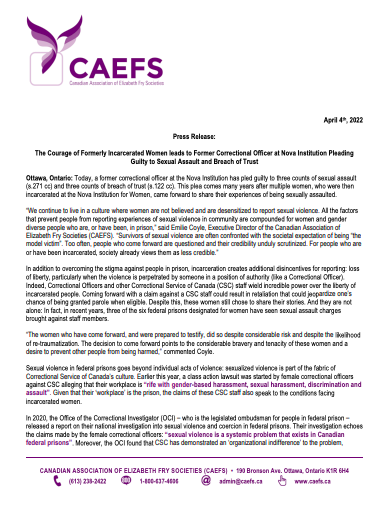New Report from the House of Commons’ Standing Committee on Justice and Human Rights
12/15/2022On December 7th 2022, the House of Commons’ Standing Committee on Justice and Human Rights released a new report on “Improving Support for Victims of Crime”.
CAEFS was invited to speak to this committee in June 2022, and we are grateful to have had the opportunity to offer our perspective on this critical issue and to have it included in this report.
In our remarks we felt that it was important to provide nuance between perpetrators and victims of harm. Emilie shared that “Most people in prison have experienced substantial adverse events in childhood and adulthood. For example, if you look to the Office of the Correctional Investigator’s research, it has shown that at least half of the people in federal prisons have a history of childhood physical, sexual and/or emotional abuse, and those numbers are even higher in the prisons designated for women. By creating a narrative that portrays a false binary between those who experience violence, we are encouraging a system and a culture that does not adopt an informed or responsible analysis of harm. For example—and this is a key one for us—the majority of street-level crime is inflicted by poor people on other poor people. A solution is not to incarcerate these people in a violent place like a prison. The solution is to ensure that there are no more poor people by eradicating poverty.” Regarding criminalized victims, she put forward that, “[w]hether a prison sentence is five years or 10 years, if somebody is not able to heal because they don’t have the psychological or therapeutic supports, then the length of the sentence doesn’t matter.”
Emilie also brought forward the perspective of people serving long or life sentences. She explained that, “For people who are serving long or life sentences—a quarter of the people in our federal prisons are serving life sentences—they are going to be subject to parole conditions for the rest of their lives. That means that they will invariably have a relationship with the people who are registered as victims in their case. Those people get a lot of information about where they are and what they’re doing. There aren’t a great deal of checks and balances with what those people do with that information. It can be leaked to the media, for example, or they could be subject to a harassing letter from a person who is registered as their victim. I think that in a system where we value rehabilitation and we are looking to heal, we have to be really careful about the interaction between people who are serving longer life sentences and the people who are registered as their victims, so that no further harm is caused.”

